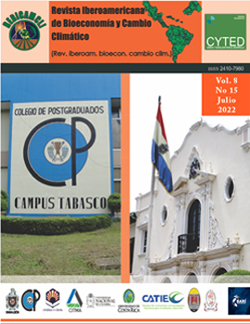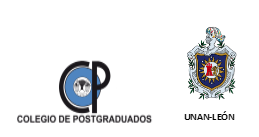Identificación molecular de Trypanosoma cruzi en un perro infectado naturalmente de Nicaragua
DOI:
https://doi.org/10.5377/ribcc.v8i15.12804Palabras clave:
Trypanosoma cruzi, Canine, Nicaragua, PCR, ZoonosisResumen
In Latin America, Chagas disease is a significant public health threat and canines play an important role in the domestic transmission cycles of Trypanosoma cruzi. This report presents a case of Chagas in a two-month-old male mongrel dog that was rescued and taken to the private Royal Pets Veterinary Clinic in the City of Managua - Nicaragua. The animal was in a cachectic state, weak and completely wet, presenting a rectal temperature of 33.6 ° C, dehydration (9%), pale mucous membranes, non-reactive lymph nodes, distended abdomen without pain on palpation, bloody ulcerative lesion in the left rib cage. In peripheral smear examination, the blood parasite Trypanosoma was detected; in addition, in the PCR analysis, amplification was obtained for Trypanosoma cruzi, but negative for Trypanosoma vivax and Trypanosoma evansi. The detection and identification of this case could raise awareness in the country about the importance of reporting canine infections as part of epidemiological surveillance programs to control human cases of Chagas disease.
Descargas
823
HTML 0
Citas
Birhanu, H., Fikru, R., Said, M., Kidane, W., Gebrehiwot, T., Hagos, A., Alemu, T., Dawit, T., Berkvens, D., Goddeeris, B. M., & Büscher, P. (2015). Epidemiology of Trypanosoma evansi and Trypanosoma vivax in domestic animals from selected districts of Tigray and Afar regions, Northern Ethiopia. Parasites & Vectors, 8(1), 212. https://doi.org/10.1186/s13071-015-0818-1
Bonilla, M. C., Castro-Vásquez, R. M., Herrero-Acosta, M. V., Urbina-Villalobos, A., & Dolz, G. (2019). Canine trypanosomiasis in an endemic Costa Rican community: Demonstration of the active infection cycle. Veterinary Parasitology: Regional Studies and Reports, 17, 100307. https://doi.org/10.1016/j.vprsr.2019.100307
Bonilla, M. C., Herrero-Acosta, M. V., Urbina-Villalobos, A., & Dolz, G. (2018). Detección de anticuerpos contra Trypanosoma cruzi en caninos de Costa Rica. Ciencias Veterinarias, 36(2), 1-14. https://doi.org/10.15359/rcv.36-2.1
Elmayan, A., Tu, W., Duhon, B., Marx, P., Wolfson, W., Balsamo, G., Herrera, C., & Dumonteil, E. (2019). High prevalence of Trypanosoma cruzi infection in shelter dogs from southern Louisiana, USA. Parasites & Vectors, 12(1), 322. https://doi.org/10.1186/s13071-019-3572-y
Fikru, R., Hagos, A., Rogé, S., Reyna-Bello, A., Gonzatti, M. I., Merga, B., Goddeeris, B. M., & Büscher, P. (2014). A Proline Racemase Based PCR for Identification of Trypanosoma vivax in Cattle Blood. PLoS ONE, 9(1). https://doi.org/10.1371/journal.pone.0084819
Kumar, S. (2017). Trypanosomosis in dog: A case report. Exploratory Animal And Medical Research, 7(2), 220-222.
Lizundia, R., Picado, A., Cordero, M., Calderón, A., Deborggraeve, S., Montenegro, V. M., & Urbina, A. (2014). Molecular and serological rapid tests as markers of Trypanosoma cruzi infection in dogs in Costa Rica. Tropical Parasitology, 4(2), 111. https://doi.org/10.4103/2229-5070.138539
Meyers, A. C., Hamer, S. A., Matthews, D., Gordon, S. G., & Saunders, A. B. (2019). Risk factors and select cardiac characteristics in dogs naturally infected with Trypanosoma cruzi presenting to a teaching hospital in Texas. Journal of Veterinary Internal Medicine, 33(4), 1695-1706. https://doi.org/10.1111/jvim.15516
Montenegro, V. M., Jiménez, M., Dias, J. P., & Zeledón, R. (2002). Chagas Disease in Dogs from Endemic Areas of Costa Rica. Memórias Do Instituto Oswaldo Cruz, 97(4), 491-494. https://doi.org/10.1590/S0074-02762002000400006
Moser, D. R., Kirchhoff, L. V., & Donelson, J. E. (1989). Detection of Trypanosoma cruzi by DNA amplification using the polymerase chain reaction. Journal of Clinical Microbiology, 27(7), 1477-1482. https://www.ncbi.nlm.nih.gov/pmc/articles/PMC267598/
https://doi.org/10.1128/jcm.27.7.1477-1482.1989
Peterson, J. K., Hashimoto, K., Yoshioka, K., Dorn, P. L., Gottdenker, N. L., Caranci, A., Stevens, L., Zuniga, C., Saldaña, A., Rodriguez, S., & Monroy, C. (2019). Chagas Disease in Central America: Recent Findings and Current Challenges in Vector Ecology and Control. Current Tropical Medicine Reports, 6(2), 76-91. https://doi.org/10.1007/s40475-019-00175-0
Roegner, A. F., Daniels, M. E., Smith, W. A., Gottdenker, N., Schwartz, L. M., Liu, J., Campbell, A., & Fiorello, C. V. (2019). Giardia Infection and Trypanosoma Cruzi Exposure in Dogs in the Bosawás Biosphere Reserve, Nicaragua. EcoHealth, 16(3), 512-522. https://doi.org/10.1007/s10393-019-01434-2
https://doi.org/10.1007/s10393-019-01434-2
Vasconcelos, L. A. S. de, Oliveira, J. C., Silva Junior, R. C. A. da, Justiniano, S. C. B., Souza, É. dos S., Magalhães, L. K. C., Silveira, H., Silva, G. A. V. da, Guerra, J. A. de O., Guerra, M. das G. V. B., Vasconcelos, L. A. S. de, Oliveira, J. C.,
Silva Junior, R. C. A. da, Justiniano, S. C. B., Souza, É. dos S., Magalhães, L. K. C., Silveira, H., Silva, G. A. V. da,
Guerra, J. A. de O., & Guerra, M. das G. V. B. (2021). Trypanosoma cruzi discrete typing unit TcIV implicated in a case of acute Chagas disease in a domiciliated dog in the western Amazon. Revista Da Sociedade Brasileira de Medicina Tropical, 54. https://doi.org/10.1590/0037-8682-0873-2020
WHO, W. H. (2015). Chagas disease in Latin America: An epidemiological update based on 2010 estimates = Maladie de Chagas en Amérique latine : le point épidémiologique basé sur les estimations de 2010. Weekly Epidemiological Record = Relevé Épidémiologique Hebdomadaire, 90(06), 33-44. https://apps.who.int/iris/handle/10665/242316
Publicado
Cómo citar
Número
Sección
Categorías
Licencia
Derechos de autor 2022 Rev. iberoam. bioecon. cambio clim.

Esta obra está bajo una licencia internacional Creative Commons Atribución-NoComercial-CompartirIgual 4.0.
Copyright © Rev. iberoam. bioecon. cambio clim. (Colegio Postgraduados y UNAN-León, Escuela de ciencias agrarias y veterinarias/ Departamento de Agroecología/Centro de Investigación en Bioeconomía y Cambio Climático (CIByCC).







